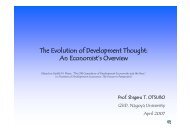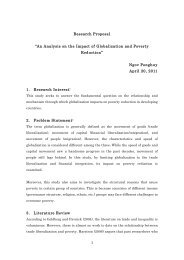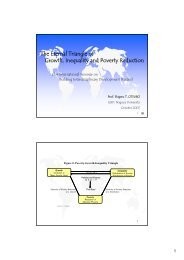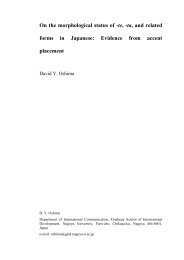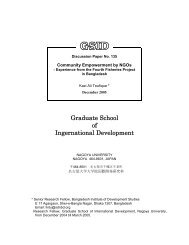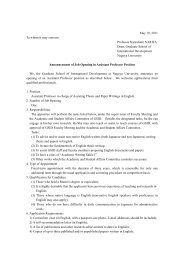Madame la professeur-フランス語における職業名詞の「女性化」
Madame la professeur-フランス語における職業名詞の「女性化」
Madame la professeur-フランス語における職業名詞の「女性化」
Create successful ePaper yourself
Turn your PDF publications into a flip-book with our unique Google optimized e-Paper software.
RECOMMENDATION 1229 (1994) [1]<br />
on equality of rights between men and women<br />
1. The Assembly affirms that equality of rights between women and men is a fundamental principle of democracy, being a<br />
factor in the recognition of the legitimacy of women's status in public life.<br />
2. It considers that equality of rights between men and women presupposes that both sexes have the same opportunities to<br />
deploy their skills in all sectors of occupational, political, family and cultural life.<br />
3. It is aware that, despite equality before the <strong>la</strong>w, there is still discrimination against women in Europe to various extent in such<br />
fields as education, the family, work or social policy.<br />
4. It has regard to the Final Dec<strong>la</strong>ration of the United Nations Conference on Human Rights, held in Vienna from 14 to 25 June<br />
1993.<br />
5. It stresses that the fundamental rights of women and girls are an inalienable, integral and indivisible part of universal human<br />
rights.<br />
6. It is convinced that greater participation by women in all levels of political life - based on the principle of "parity democracy"<br />
(equal representation) - would enable politicians of both sexes to gain a fuller understanding and perception of all the issues<br />
facing a modern democratic society.<br />
7. It welcomes the progress made in the Nordic countries regarding women's representation in parliaments.<br />
8. The Assembly recommends that the Committee of Ministers:<br />
i. establish the principle of equality of rights between women and men as a fundamental human right in an<br />
additional protocol to the Convention for the Protection of Human Rights and Fundamental Freedoms;<br />
ii. overcome the ambiguity of the French term droits de l'homme by rep<strong>la</strong>cing it with droits de <strong>la</strong> personne;<br />
iii. pursue and intensify its work on equality of rights between women and men in order to achieve complete de jure<br />
and de facto equality, p<strong>la</strong>cing particu<strong>la</strong>r emphasis on equal participation in political life and the decision-making<br />
process;<br />
iv. pay proper attention to ways of increasing the number of women in the representative organs of the Council of<br />
Europe, as well as at all levels of its Secretariat, including the highest grades, and provide the requisite<br />
administrative assistance at Secretariat level for activities re<strong>la</strong>ting to equality between women and men;<br />
v. introduce in French the feminist form of titles and names of functions into current <strong>la</strong>nguage, for instance by<br />
extending and implementing the French circu<strong>la</strong>r of 11 March 1986 on feminisation of names of professions,<br />
functions, grades or titles.<br />
[1] Assembly debate on 24 January 1994 (1st Sitting) (see Doc. 6985, report of the Committee on Legal Affairs and Human Rights, Rapporteur:<br />
Mrs Err).<br />
Text adopted by the Assembly on 24 January 1994 (1st Sitting).<br />
7




